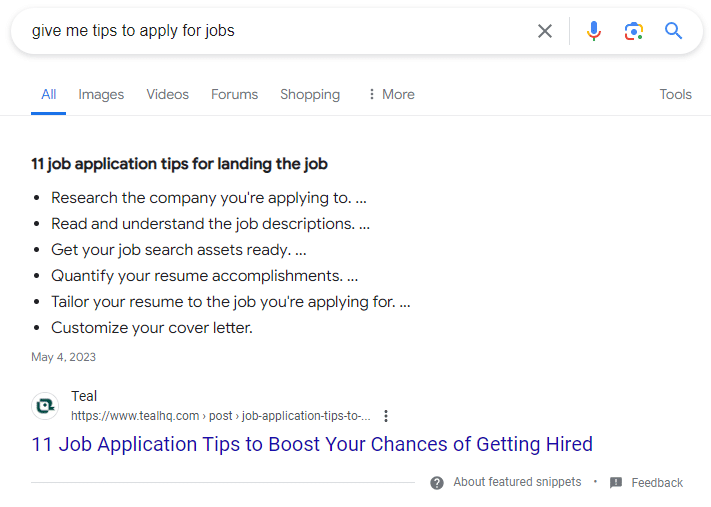Few trends have grown as rapidly and necessitated as many adaptations in Digital Marketing strategies as voice search.
A technology that barely existed at the beginning of the 2010s is now in the hands of almost every American — and it can be activated by a touch or a single “hello”. The State of Marketing Report backs up its big role in 2024.
But what exactly does the surge in voice search mean for your content? How can you adapt and gain visibility by appearing more frequently as an answer to your audience’s inquiries?
In this post, we provide insights into the future. We discuss and provide valuable tips on how to optimize your content for voice search.
What is Voice Search?
When we delve into the technology that enables a machine to hear and understand human inquiries, we need to go way back.
In fact, the first device created for that purpose was the IBM Shoebox in 1961.
But you don’t have to know how technology evolved and how it works to incorporate it into your strategy. All you need to know is how it affects your marketing from now on.
Nowadays, voice search is a system or software that uses A.I. not only to hear but interpret the user’s intentions so it can return results that are relevant to that specific question.
For example: if a person is about to leave home and asks Alexa, “Should I grab my umbrella?”, the software understands that this question should be in the context of wanting to know the weather.
So voice search is getting better by combining automatic recognition and sophisticated interpretation. And the more advanced it becomes, the more people start using it.
Why Is It So Important?
Yes, voice search is cool, and a lot of people prefer it as a convenience.
But why does that matter for CMOs and their plans?
The thing is, knowing the weather is just one small practical benefit for users. The majority of voice search systems today automatically Google what the user asks and return the first, most relevant result.
So SEO is the key to being prevalent in this new era. As the input demands some content optimization (we will talk more about it below), those who can shape their plans to embrace the technology will be ahead of the competition in a constantly growing field.
But do people really use voice search?
Actually, nearly 60% of Americans have said they’ve used voice search at least once. And sales of voice-activated speakers are projected to surpass 30 billion dollars in 2024.
And those numbers are far from stagnating. In 2023, Amazon claimed that it had sold well over 500 million Alexa-powered devices around the world.
Beyond even that, we are seeing almost every smartphone bought in the U.S. leaving the box ready for voice search.
If we look at the estimated number of 4.2 billion active voice assistant devices in the country, we can surely say the technology is now mainstream, and we will only use it more in the future. That is why you must get ready to optimize your content for voice search.
How to Optimize Your Content for Voice Search?
One important statistic that explains perfectly why you should optimize your content right now: the majority of requests made via voice aren’t like the typical keyword searches we do in text. Examples of voice searches include:
- “Hey Siri, what’s the weather forecast for tomorrow?”
- “OK Google, how do you make chocolate chip cookies?”
- “Alexa, play the latest news podcast.”
- “Hey Siri, set a timer for 20 minutes.”
- “OK Google, find the nearest Italian restaurant.”
That means marketers need a new approach when planning content and SEO now, and even more so in the future.
Let’s take a look at what some of the most prominent names in the area have to teach us about the actions you have to take to improve your visibility via voice search.
Focus on snippets
Snippets are direct and concise results Google features for considering them relevant and useful answers to a determined search.
For voice, as most of the time there isn’t even a screen on the voice assistant device, most results come from snippets.
They may come as a straight answer:

Or they can provide some steps to guide the user:

This content is usually taken straight from your blog or website, and links your audience with your brand without even visiting it. It is a great way to raise brand awareness and stand out as an authority on that subject.
Snippets are so powerful they are called Position Zero, a result before the results. And they are even more important for voice search.
Brands looking to reach consumers using verbal answers from their assistants must learn to answer questions simply and optimize their content for voice search.
Structure your content better
Featured snippets tell us a simple truth about voice search: direct, short, and easy-to-understand answers are more prone to be chosen by Google as the first result.
Then a great tip is to pay closer attention to meta descriptions, lists, subheadings, and introductions that are more natural and direct to the point.
A well-structured content results in double benefits for your company: it appeals more to Google’s indexation tool and grabs your audience’s attention quicker. Both reinforce your brand’s authority and generate more traffic.
Optimize for questions
Consumers using voice search usually do so in the form of a question — a lot more than when they are writing. And that means marketers should optimize at least part of their content for question-specific searches.
Most of those phrases start with who, when, what, why, how. They do that to get instant answers like the weather, to look at the traffic.
But they also look up information about a brand or compare products. If your content provides assertive and direct answers that fit those questions, you will constantly be picked as the best result.
Experiment with voice assistants
When you write content aimed at boosting organic traffic, you probably do some tests on the keyword, and the kind of results ranked at the top.
As voice search has its particularities, you should be doing the same specifically for it. Use Google Assistant, Siri, Alexa, Cortana, and every major technology on the market.
Experiment with different questions related to the keywords and see how they answer, and what results they show.
If you are not receiving the outcomes you expect, you should consider whether consumers are using different words or phrases when talking rather than writing — and tweak content based on that.
Hear how your content is read
When Google finds an answer that fits the question made, it often uses its Text-to-Speech technology to read a featured snippet or the introduction of an article to the user.
Most voice assistants have sophisticated TTS tools, but some words and phrases can sound strange and make them look at the next results for a better understanding.
So, when testing multiple voice searches, pay attention to how they read what your team wrote. This simple action can help you tweak and improve the content.
Address local intent
In a study conducted by BrightLocal in 2018, they found that 58% of U.S. consumers used voice search to find local businesses. This shows how the combination of mobile and voice is powerful for local online marketing.
Individual locations can use Google My Business to take advantage of that. It is a strategy that involves not only keeping your listing up to date but also writing content with local intent to capture the attention of consumers in the area.
Use schema
Using schema (structured data markup) helps search engines figure out what is on a given page, and allows machine learning algorithms to access your data easily.
That means marking up for Google’s Knowledge Graph and learning to optimize using the pending Speakable markup from Schema.org, which indicates sections of a page that are particularly appropriate for text-to-speech conversion.
Having details about a product or service like pricing, color, stock, and features marked up in schema can improve the chance crawlers will find it. And it will give richer answers about your company to the audience.
Remember SEO best practices
And, of course, don’t forget the basics. SEO is still the best way to get organic traffic and retain your visits via voice or text.
All of these efforts, in the end, are pointed at the same goal. Marketers optimizing their content for voice search today will give users (and the search engine) what they need.
So start now by including voice search in your Digital Marketing plan and putting these tips into action to adapt to your audience’s new habits.
And how about strengthening your strategy and climbing Google results even more? Download now our on-page SEO guide!
Voice Search Optimization FAQs (Frequently Asked Questions)
What is voice search optimization?
Voice search optimization involves adapting your website and content to align with the way people verbally inquire through voice-activated assistants like Siri, Alexa, or Google Assistant, aiming to improve visibility in voice search results.
What is the difference between voice search and SEO?
Voice search focuses on conversational queries spoken aloud to devices, while SEO (Search Engine Optimization) traditionally targets text-based queries typed into search engines. Voice search optimization often involves tailoring content to match natural language and question-based queries.
How to optimize your business for voice search?
To optimize your business for voice search, ensure your website is mobile-friendly, provide concise and clear answers to common questions, optimize for local search by listing your business on platforms like Google My Business, and focus on creating content that aligns with conversational queries and long-tail keywords.
What is an example of a voice search?
An example of a voice search query is “Hey Siri, what’s the weather forecast for tomorrow?”
What type of keywords should be included for voice search?
Keywords for voice search should include conversational phrases, natural language queries, and question-based queries that people are likely to speak aloud when using voice-activated assistants.
How accurate is Google Voice search?
Google Voice search is generally quite accurate, leveraging advanced natural language processing and machine learning algorithms to understand and respond to user queries effectively. However, its accuracy may vary depending on factors such as accent, pronunciation, and the complexity of the query.


![[Rock NA] State of Marketing Reports 2024 – Comkt Hubspot State of Marketing Report 2024](https://rockcontent.com/wp-content/uploads/2022/07/Banner-Fino-Rock-Convert-2500-%C3%97-500-px-19.png)






